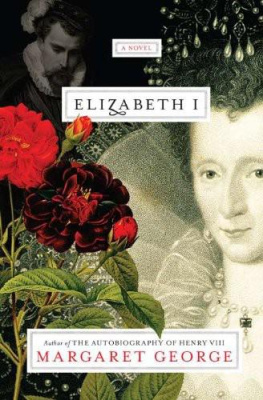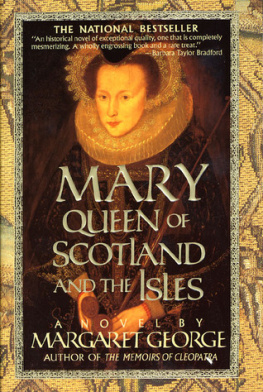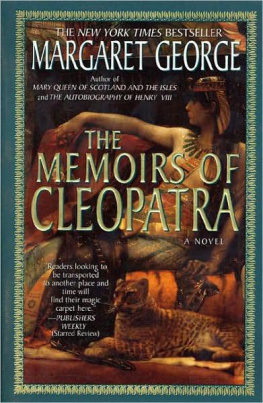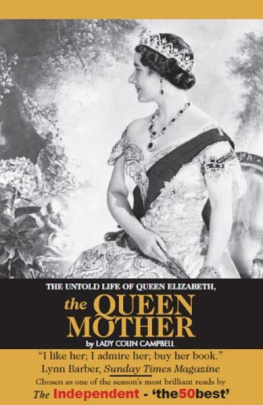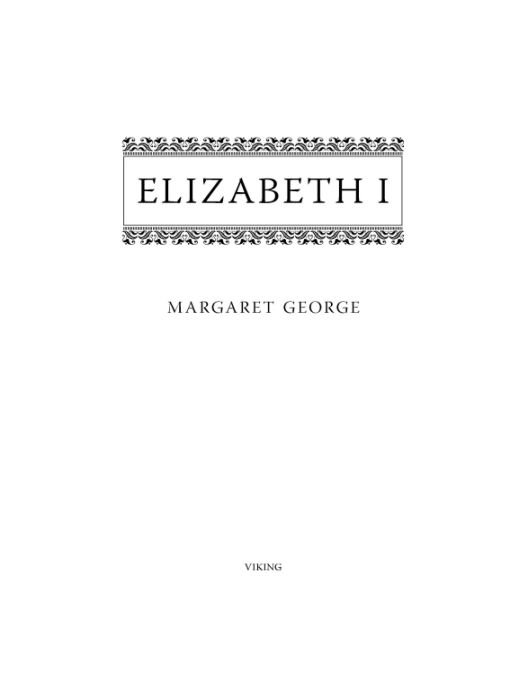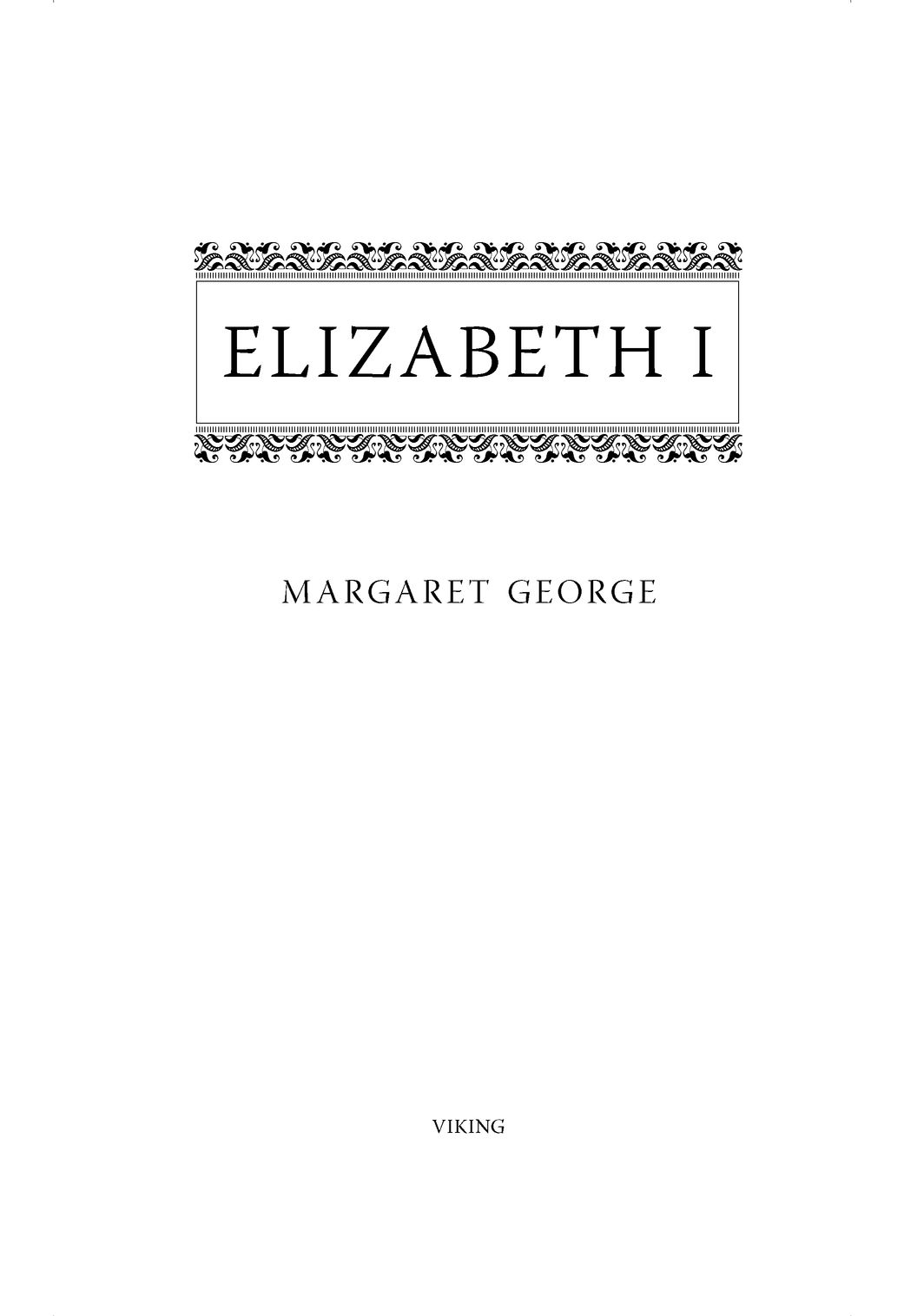Table of Contents
ALSO BY MARGARET GEORGE
The Autobiography of Henry VIII
Mary Queen of Scotland and the Isles
The Memoirs of Cleopatra
Mary, Called Magdalene
Helen of Troy
Lucille Lost (childrens book)
For Robert,
My son-in-law,
A loyal subject of
Her Majesty Queen Elizabeth
Past and Present
THANKS AND ACKNOWLEDGMENTS
As always, familymy husband Paul, daughter Alison, son-in-law Robert, sister Rosemarywere supportive and helpful, and my agent Jacques de Spoelberch and editors Carolyn Carlson and Beena Kamlani made the book shine brighter after it came into their hands. I want to thank Professor William Aylward, Classics Department, University of Wisconsin-Madison, for his help in Latin translations, Dr. Mary Magray, Irish historian and lecturer, Department of Liberal Studies and the Arts, University of Wisconsin-Madison, for her knowledge and help with the intricacies of Irish history in Elizabeths period, and my friend Miki Knezevic for thoughtful ideas about the characters. Dr. Lynn Courtenay and Dr. Nathaniel Alcock ferreted out the exact wording on the Dudley family tomb in Warwick, invaluable help for the story. My father, Scott George, first told me about Old Parr when he looked for his grave in Westminster Abbey. The friendship and support of my SCC sistersLola Barrientos, Patsy Evans, Chris Thomas, Beverly Resch, Mary Sams, Diane Hager, and Margaret Harriganover the years has meant a great deal to me. And finally, my thanks to fellow Elizabethans Jerry and Nancy Mitchell, who appeared one night at Hatfield House and made the banquet magical.
And the spirit of Elizabeth herself, I believe, hovered over the book as it was taking shape and whispered her guidance.
ARCHBISHOP CRANMER:
In her days every man shall eat in safety,
Under his own vine, what he plants; and sing
The merry songs of peace to all his neighbours:
God shall be truly known; and those about her
From her shall read the perfect ways of honour,
And by those claim their greatness, not by blood.
...
She shall be, to the happiness of England,
An aged princess; many days shall see her,
And yet no day without a deed to crown it.
Would I had known no more! But she must die,
She must, the saints must have her; yet a virgin,
A most unspotted lily shall she pass
To th ground, and all the world shall mourn her.
KING HENRY VIII:
O Lord Archbishop,
Thou hast made me now a man. Never before
This happy child did I get anything.
This oracle of comfort has so pleasd me
That when I am in heaven I shall desire
To see what this child does, and praise my Maker.
William Shakespeare, Henry VIII, V, iv: 33-38; 56-68
The Vatican, March 1588
Felice Peretti, otherwise known as Pope Sixtus V, stood swaying before the stack of rolled Bulls.
They were neatly arranged like a cord of wood, alternating short and long sides, their lead seals hanging down like a row of puppy tails.
Ah, he said, eyeing them with great satisfaction. They seemed to radiate power. But one thing was lacking: his blessing.
Raising his right hand, he spoke in sonorous Latin: O sovereign God, hear the prayer of your servant Sixtus. Acting in accordance with my office as the vicar of Christ, his representative on earth, who has the power to bind and loose, to forgive sins or withhold forgiveness, I have pronounced judgment on that wicked woman of England, the pretender queen. She is hereby excommunicated from the body of Christendom until such time as she repents. In order that those living under her rule do not go down into damnation with her, we bless the Enterprise of England. Aboard the ships of the great Armada will go these Bulls of excommunication and sentence upon Elizabeth, the pretender queen of England, calling for her deposition, in order that her subjects may be rescued from her impiety and perverse government. They will see the happy light of day when Christs avengers set boots upon English soil. There they will be distributed to the faithful. Merciful God, we ask this in the saviors name, and for his Holy Church.
The sixty-eight-year-old pope then slowly circled the pile, making the sign of the cross and sprinkling it with holy water. Then he nodded to the Spanish envoy standing quietly to one side.
You may transport them now, he said. The Armada leaves from Lisbon, does it not?
Yes, Your Holiness. Next month.
Sixtus nodded. They should arrive in plenty of time, then. You have waterproof canisters for them?
I am sure they will be provided. King Philip thinks of everything.
The South Coast, England, April 1588
The old hermit shuffled out of his shelter, as he did every morning.
He made his bed in the ruins of St. Michaels Chapel, perched near the peak of a jutting piece of headland stretching out into Plymouth Sound. He stood on the rim of the cliff, the ocean far below him, his eyes darting left and right, searching. The morning sun, glinting off the water, made it hard to see. He shaded his eyes and squinted, trying to detect the telltale shape of sails on the horizon. Nothing. Not today.
Muttering, he turned to attend to his other businesspreparing the beacon. He had found an abandoned dolmen, an ancient monument, at the pinnacle of the peak and had been carrying twigs, straw, and kindling there for days. The fire that would flare out from the cone-shaped mounted brackets must be visible for miles, until the next beacon. And this was likely the first. This would be the place, if any place, that the Armada would first come into view. And he, the hermit of St. Michaels, would keep vigilant watch as long as there was a whisper of light to see by.
He patted the dolmen. Pagan stuff. Made long ago by vanished people. But who cared, if it helped in the fight against the Spanish enemy?
The Tower of London, May 1588
Quiet! Philip Howard motioned to the priest.
Someone was coming. The guard was making his rounds. His footstep on the stones outside was a sound that Philip heard even in his dreams. He bent his head down, resting it between his knees, his hands hanging limply. He must look asleep. The priest did likewise, drawing his cloak up around himself. The others in the room fell silent, turned to stone.
The footsteps paused; the shutter over the iron grille in the prisoners door lifted. Then it clanged down again, and the footsteps continued.
Philip stayed still for another few minutes to be safe. Finally he whispered, Hes gone. He wont make rounds again for two or three hours. Lets begin. Lets begin Gods work.
The others in the chamber stirred. The priest threw back the covering on his head. In the name of the Holy Mother Church, he said, I will perform this Mass.
Philip shook his head. It must be dedicated to another intention, he said. I was not a traitor until they sought to make me one. Now, held for five years here in the Tower, I have seen the evil of the queen and her so-called church firsthand. It must perish. She must perish. And my godfather King Philip will ensure that.

